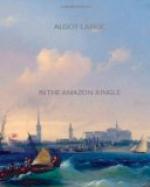The expedition consisted of the six men, above mentioned, all, except the Chief, Marques, unmarried. After leaving the main building we went down to the store-room where we chose the necessary articles of food—enough to last us for three or four weeks. Our staples were to be dried pirarucu, the largest fish of the Amazon, some dried or “jerked” beef, and a large quantity of the farinha, the eternal woody and unpalatable meal that figures on every Brazilian’s table. Besides these, we carried sugar, coffee, rice, and several bottles of “Painkiller” from Fulton Street, N.Y. Hammocks and cooking utensils completed our outfit. I took with me a large plate camera, photographic plates and paper, chemicals, scales and weights; also a magnifying glass, a primitive surgical outfit, and a hypodermic needle with several dozen prepared “ampules.” My men were armed with the usual .44 Winchesters and some ancient muzzle-loaders, while I had my 9mm. automatic Luger pistol. When we were fully packed, each man carried a load weighing eighty-five pounds, strapped by means of bark strips to the shoulders, with his rifle in his left hand and a machete to clear the path in his right.
Thus equipped, we left headquarters, not knowing how or when we would see it again, while the natives fired a farewell salute, wishing us God-speed.
After a few hours by canoe, up the Itecoahy, we left the river and turned our faces inland. Our way now led through dense forest, but for four hours we travelled in a region familiar to the rubber-workers, and we were able to follow pathways used by them in their daily work.
Let no one think that a jungle trail is broad and easy. As I stumbled along the tortuous, uneven path, in the sweltering mid-day heat, pestered by legions of piums or sand-flies and the omnipresent mosquitoes, climbing, fallen trees that impeded us at every turn, I thought that I had reached the climax of discomfort. Little could I know that during the time to come I was to look back upon this day as one of easy, delightful promenading.
The four hours’ march brought us to an open place, apparently a clearing, where the estrada suddenly seemed to stop. Exhausted, I threw myself on the moist ground while the Chief explained our position. He said that we were now at the end of the cut estrada and that beyond this we would have no path to follow, though he had somewhat explored the region farther on the year previous, during a similar expedition. We found that the undergrowth had been renewed to such an extent that his old track was indistinguishable, and we had to hew our every step. When we resumed the march I received a more thorough understanding of what the word jungle really means. Ahead of us was one solid and apparently impenetrable wall of vegetation, but my men attacked it systematically with their heavy machetes. Slowly we advanced, but I wondered that we made any progress




